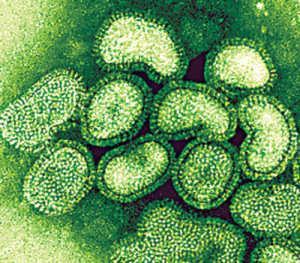During the last week, virologists have been sequencing and analyzing swine flu cells, and have decided that for the time being, the new strain of flu--called H1N1--is not as virulent as was originally feared, even though it continues to spread throughout the world.
We're not out of the woods yet, though, officials say. Sweden and Poland say citizens there have been infected. Sweden says a woman in her 50s who visited Chicago had tested positive for the virus, Reuters reported on Wednesday.
As of Wednesday afternoon, there have been 1,516 officially reported cases in 22 countries, the World Health Organization says, with 642 confirmed cases in the U.S.



Ad Statistics
Times Displayed: 60606
Times Visited: 1928 Ampronix, a Top Master Distributor for Sony Medical, provides Sales, Service & Exchanges for Sony Surgical Displays, Printers, & More. Rely on Us for Expert Support Tailored to Your Needs. Email info@ampronix.com or Call 949-273-8000 for Premier Pricing.
Meanwhile, the virus has spread to Britain, Spain, Italy and Germany. If it continues to spread throughout Europe, it could be labeled a pandemic. (A pandemic simply means the virus has spread around the world. It doesn't mean it will kill people en mass, experts say.)
"Those numbers will go up, we anticipate, and unfortunately there are likely to be more hospitalizations and more deaths," said Health and Human Services Secretary Kathleen Sebelius.
WHO officials will meet next week to decide whether vaccine makers should switch from seasonal to pandemic flu production. Currently, CDC is telling manufacturers to continue making traditional flu vaccines.
Meanwhile, in Mexico City, security guards at a tower checked office workers with a heat scanner to make sure they didn't have fever when they returned to work, Reuters reports.
The Mexican government last week ordered most businesses to close to rapidly contain the virus and now says it appears to be ebbing. Officials around the world have congratulated Mexico for its swift response to the outbreak.
On Alert but Business as Usual
While preparing for a pandemic, CDC now says that even when a student is infected with the H1N1, schools should remain open. And the agency was certainly not in agreement with Vice President Joe Biden's advice last week that people should steer clear of airplanes. (Biden's remarks were quickly corrected.)
Most reassuring is the fact that people who are getting H1N1 are contracting mild cases and are responding to flu-fighters, Roche's Tamifu and GSK's Relenza. What's more, officials speculate that this year's flu vaccine might be conferring protection on people who would have otherwise been harder hit.
But the virus could thrive during a tropical summer and return in a more virulent incarnation during the winter, experts say.
Origins of the Virus: Wisconsin?

